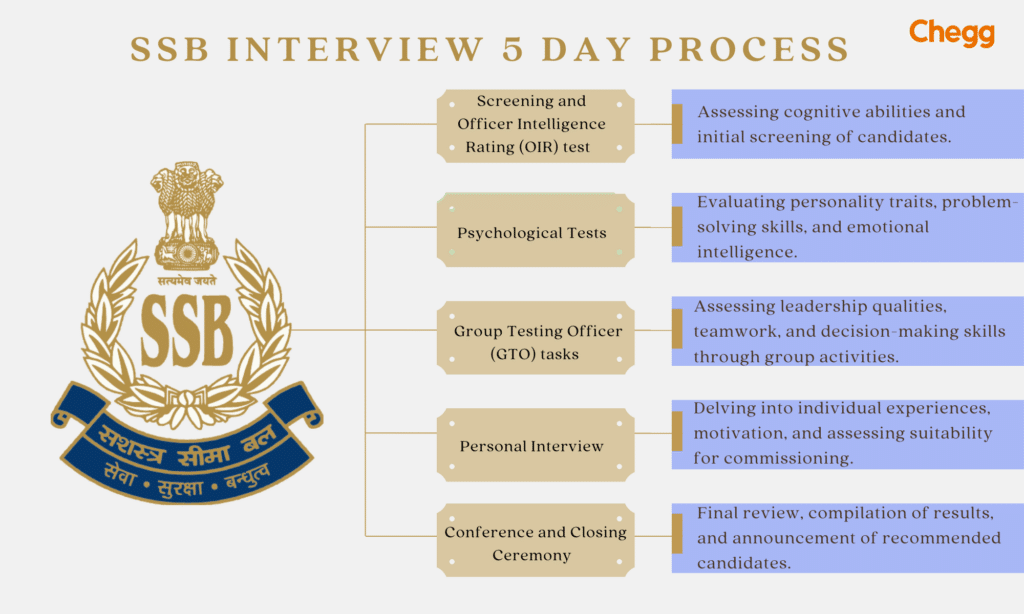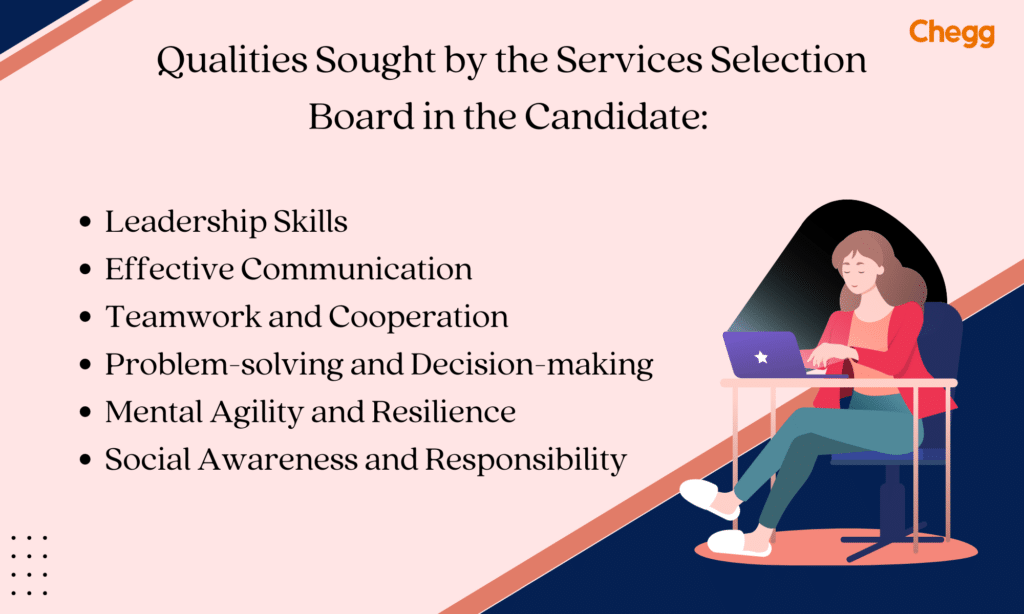

Quick Summary
- The SSB Interview is not just an ordinary job interview; it is a comprehensive evaluation that tests various aspects of an individual’s character, intelligence, and aptitude.
- SSB Interview aims to identify individuals who possess the necessary qualities to become effective leaders, decision-makers, and officers in the defense forces.
- Success in the SSB interview demands dedication, perseverance, and a holistic approach to personal development.
Table of Contents
The SSB (Services Selection Board) Interview is a crucial step in the selection process for individuals aspiring to join the esteemed defence forces. It serves as a platform to assess candidates for their suitability, leadership potential, and overall personality traits required to serve as an officer.
The SSB Interview is not just an ordinary job interview; it is a comprehensive evaluation that tests various aspects of an individual’s character, intelligence, and aptitude. According to official statistics provided by Jagran Josh, the rate of selection for the SSB Interview is approximately 6-10%.
The SSB Interview holds immense significance as it determines whether a candidate possesses the qualities necessary to become an officer in the defence forces. The selection board carefully examines attributes such as leadership, problem-solving ability, communication skills, teamwork, decision-making, and determination.
These qualities are essential for individuals who will be responsible for leading troops, making critical judgments, and upholding the values and integrity of the armed forces.

SSB Interview Process
The SSB Interview process consists of multiple stages, each designed to assess specific aspects of a candidate’s personality and abilities. The selection process typically includes the following stages:
Day 1: Screening Test
This initial stage aims to shortlist candidates based on their verbal and non-verbal intelligence, reasoning, and aptitude. It includes tests like:
Officer Intelligence Rating (OIR) Test
The Officer Intelligence Rating (OIR) Test is a crucial component of the SSB Interview process that aims to assess a candidate’s cognitive abilities, problem-solving skills, and intelligence quotient (IQ). It is conducted on the first day of the SSB Interview and consists of verbal and non-verbal reasoning questions.
During the OIR Test, candidates are presented with a series of questions that test their logical reasoning, analytical thinking, and quick decision-making abilities. The verbal reasoning section includes tasks like completing series, finding analogies, and solving mathematical equations, while the non-verbal reasoning section assesses a candidate’s ability to perceive patterns, spatial relationships, and abstract reasoning.
Picture Perception and Description Test (PPDT)
The Picture Perception and Description Test (PPDT) is a psychological test conducted during the SSB Interview to assess a candidate’s ability to perceive details, think creatively, and effectively communicate their thoughts. It is usually conducted on the second day of the SSB Interview.
During the PPDT, candidates are shown a hazy picture or a blurred image for a duration of 30 seconds. Afterward, they are required to write a story based on the picture, highlighting the characters, their actions, and the situation depicted. The objective of this test is to assess a candidate’s imagination, storytelling skills, social adaptability, and the ability to form a coherent narrative from limited visual information.
Day 2: Psychological Tests
These tests evaluate the candidate’s psychological suitability for an officer’s role. They assess qualities such as social adaptability, emotional stability, and problem-solving skills. The tests may include:
Thematic Apperception Test (TAT)
The TAT is a psychological test that uses ambiguous pictures to assess a candidate’s personality traits, thought processes, and emotional responses.
Word Association Test (WAT)
The WAT assesses a candidate’s thought process and personality traits by measuring their immediate reactions and spontaneous associations to given words.
Situation Reaction Test (SRT)
The SRT evaluates a candidate’s decision-making skills and problem-solving abilities by presenting real-life scenarios and assessing their responses and actions.
Self-Description Test (SD)
The SD provides insights into a candidate’s self-perception, self-awareness, and understanding of their strengths and weaknesses through a written self-description.
Day 3: Group Testing Officer (GTO) Tasks
This stage focuses on assessing the candidate’s ability to work effectively in a group and exhibit leadership qualities. It involves tasks such as group discussions, group planning exercises, outdoor group tasks, progressive group tasks, and individual obstacles.
Day 4: Personal Interview
The personal interview is conducted to gain deeper insights into the candidate’s background, motivations, aspirations, and potential. It aims to evaluate the candidate’s communication skills, self-confidence, knowledge, and overall personality.
Here’s a table outlining different types of questions that are commonly asked during the SSB Interview:
|
Question Type |
Description |
|
Personal Information |
Questions about your background, education, hobbies, interests, family, and personal experiences. |
|
Motivation and Aspirations |
Inquiries about your reasons for joining the defence forces, career goals, and aspirations. |
|
Situation-Based Questions |
Scenarios or hypothetical situations presented to assess your decision-making and problem-solving skills. |
|
Leadership and Teamwork |
Questions related to your leadership experiences, teamwork skills, ability to work in a group, and handling conflicts. |
|
Current Affairs and General Knowledge |
Questions testing your awareness of recent national and international events, defence-related news, and general knowledge. |
|
Défense and Security Policies |
Questions about defence strategies, security policies, military operations, and national security issues. |
|
Ethical Dilemmas |
Situations that require you to make ethical decisions and explain your thought process and rationale. |
|
Your Strengths and Weaknesses |
Self-assessment questions focusing on your strengths, weaknesses, areas for improvement, and self-awareness. |
|
Crisis Management |
Questions on handling crisis situations, emergency response, and decision-making under pressure. |
|
Behavioral and Situational |
Scenarios to evaluate your behaviour, adaptability, initiative, resilience, and communication skills. |
Note: Remember, the SSB Interview questions can vary, and it’s essential to be prepared for a wide range of topics and question types. Use this table as a reference to structure your preparation and practice answering different types of questions effectively.
Day 5: Conference
The final stage of the selection process is the conference, where all assessors meet to discuss and finalize the candidates’ recommendations based on their performance in the previous stages.
Throughout the selection process, the SSB Interview aims to identify individuals who possess the necessary qualities to become effective leaders, decision-makers, and officers in the defense forces. It is a rigorous and comprehensive evaluation that goes beyond academic achievements and focuses on assessing an individual’s character, potential, and commitment to serving the nation.
Read about: SSB Head Constable 2023: Latest News, Eligibility, Salary & Vacancies

Preparing for the SSB Interview
Before diving into the preparation process, it is crucial to thoroughly research and understand the format of the SSB Interview. Gain a comprehensive understanding of the various stages, tasks, and assessments involved.
Familiarize Yourself with the Selection Board
Learn about the structure and composition of the SSB, including the board president, deputy president, and other assessors. Understanding their roles and expectations will help you align your preparation accordingly.
Know the Different Stages
Research each stage of the SSB Interview in detail. Understand the purpose and objectives of the screening test, psychological tests, GTO tasks, personal interview, and conference. This knowledge will give you a clear roadmap of what to expect and how to approach each stage.
Study Sample Materials
Look for sample materials, books, and resources specifically designed for SSB Interview preparation. These materials often provide insights into the interview format, sample questions, and tips for tackling each stage. Utilize them to enhance your understanding and familiarity with the process.
Seek Guidance from Experts
Connect with individuals who have successfully gone through the SSB Interview process. Seek their guidance and advice on how to approach each stage effectively. Their personal experiences can offer valuable insights and help you prepare more strategically.
Also Know About: How to Introduce Yourself in an Interview
Gathering Required Documents and Understanding the SSB Call Letter
The SSB Call Letter is a crucial document that serves as an official invitation for the SSB Interview. It is issued by the respective Services Selection Board and contains essential information regarding the date, time, and venue of the interview. Understanding the importance of the SSB Call Letter is vital for a smooth and successful interview process.
1. Confirmation of Interview
The SSB Call Letter confirms your selection for the interview. It validates your eligibility and indicates that you have progressed to the next stage of the selection process. Without the call letter, you will not be permitted to participate in the SSB Interview.
2. Information and Instructions
The call letter provides important details about the interview, such as the reporting time, reporting venue, and any specific instructions or documents to carry. It is essential to carefully read and understand all the instructions mentioned in the call letter to ensure a hassle-free experience.
3. Legal Document
The SSB Call Letter acts as a legal document that verifies your identity and eligibility to participate in the interview. It is crucial to keep the call letter safe and secure throughout the selection process.
Here’s a sample of what a Call Up Letter for an SSB Interview looks like.

Verifying Document Authenticity and Accuracy
Before the SSB Interview, it is essential to verify the authenticity and accuracy of all the documents you will be carrying. Pay attention to the following:
1. Check for Validity
Ensure that your identity proof, educational certificates, and other documents are valid and have not expired. If any documents have expired, renew them before the interview.
2. Cross-Check Information
Review all the details mentioned in the documents, such as your name, date of birth, educational qualifications, etc., to ensure accuracy. Any discrepancies should be rectified well in advance.
3. Make Copies
Create multiple copies of each document and organize them in a file or folder. Keep both the original and photocopies securely, as you may need to present them during the interview.
4. Organize the Documents
Arrange all the documents in the order specified in the call letter. This will help you present them systematically and avoid any confusion during the verification process.
Documents Required for the Interview:
- Identity Proof (Original and photocopies of your valid government-issued identity proof, such as Aadhaar card, PAN card, passport, or driver’s license)
- Educational Certificates (Educational certificates, including mark sheets, degree/diploma certificates, and any other relevant academic documents)
- Character Certificate (Character certificate from a reputable authority, such as your school/college principal or a gazetted officer, to vouch for your moral conduct and integrity.)
- Domicile Certificate (If required, provide a domicile certificate or proof of residency as per the guidelines mentioned in the call letter.)
- Passport-size Photographs
By giving due importance to the SSB Call Letter and gathering the required documents with utmost care, you demonstrate your preparedness and professionalism. It reflects your attention to detail and commitment to complying with the selection board’s requirements.
Pro Tips to Excel in the Interview
|
Pro Tip |
Subtopics Covered |
|
Pro Tip 1: Building a Strong Foundation |
|
|
Pro Tip 2: Enhancing Communication Skills |
|
|
Pro Tip 3: Mastering Group Discussions and Group Planning Exercises |
|
|
Pro Tip 4: Excelling in Psychological Tests |
|
|
Pro Tip 5: Nailing the Personal Interview |
|
|
Pro Tip 6: Physical Fitness and Health Preparation |
|
|
Pro Tip 7: Developing Leadership and Teamwork Skills |
|
|
Pro Tip 8: Enhancing General Awareness and Knowledge |
|
|
Pro Tip 9: Mock Tests and Practice Sessions |
|
|
Pro Tip 10: Mental Preparation and Confidence Building |
|
Feel free to use this table as a reference for your SSB Interview preparation.
Suggested Read:
Tips to Ace Your Next Group Discussion
You Must Know These Interview Etiquette Tips
What After the Interview?
After the completion of the SSB Interview, candidates eagerly await the announcement of results. The selection process involves careful evaluation of each candidate’s performance and suitability for the defence forces.
Result Declaration
The Services Selection Board conducts a thorough review of the candidates’ performance and prepares a list of recommended candidates. The results are usually declared after a few weeks or months, depending on the specific board and selection cycle.
Merit List
A merit list is published, consisting of the names of candidates who have cleared the SSB Interview successfully. The candidates are generally categorized based on their performance and suitability for different branches, such as the Army, Navy, or Air Force.
Selection Board Conference
The selection board holds a conference to discuss and finalize the recommendations for each candidate based on their performance in the SSB Interview. The conference considers factors such as individual assessments, group performance, and overall suitability for commissioning.
Medical Examination and Final Merit List
Candidates who are recommended by the selection board proceed to the next stage, which involves a thorough medical examination. This examination determines the candidate’s physical and medical fitness to serve in the defence forces. Here’s what to expect during this stage:
Medical Examination
The recommended candidates undergo a comprehensive medical examination conducted by a designated medical board. This examination assesses their physical fitness, visual acuity, hearing ability, and overall health. The examination also includes laboratory tests and X-rays to detect any underlying medical conditions.
Final Merit List
After the medical examination, a final merit list is prepared, consisting of candidates who have cleared both the SSB Interview and the medical examination. The final merit list determines the order of selection for various branches and training academies.
Joining Instructions and Training
Candidates who make it to the final merit list receive joining instructions from the respective services. These instructions provide details about reporting dates, training academies, and further procedures to complete before joining. Here’s what happens during this stage:
Reporting and Documentation
Candidates report to their designated training academies on the specified date mentioned in the joining instructions. They undergo various administrative processes, including document verification, completion of formalities, and filling out necessary paperwork.
Induction and Training
Once the administrative processes are complete, candidates commence their induction and training at the respective academies. The training period varies depending on the branch and service, and it aims to develop the candidates’ skills, knowledge, discipline, and physical fitness required for their roles as officers.
Commissioning
Upon successful completion of the training period, candidates are commissioned as officers in their respective branches. They take an oath of allegiance and officially join the defence forces. The officers are then assigned to their respective units and begin their professional journey in the armed forces.
Best of Luck!
In conclusion, the SSB interview is a crucial step towards a career in the defence forces. It evaluates candidates on their leadership, communication, and problem-solving abilities. Preparation involves understanding the interview format and the qualities sought by the board. After the interview, candidates undergo medical examination and await the announcement of results. Successful candidates receive joining instructions and undergo training.
Success in the SSB interview demands dedication, perseverance, and a holistic approach to personal development. By following the tips and strategies discussed, candidates can increase their chances of excelling in the interview and embarking on a rewarding career of service and honour in the defence forces.
Prepare for success in your SSB interview with Chegg’s’ expert guidance and tailored Interview tips to make a lasting impression!
Frequently Asked Questions
Who qualifies for the SSB interview?
The SSB interview is conducted for candidates who aspire to join the Indian Armed Forces as officers. Candidates who have cleared the written exam or meet specific eligibility criteria for their respective entry scheme are eligible to appear for the SSB interview.
Is the SSB interview hard?
Prepare for the challenging SSB interview, evaluating leadership, communication, and problem-solving skills essential for a career in defense. With thorough preparation and a positive mindset, increase your chances of success
What is done in 5 days of SSB?
The SSB interview is typically conducted over a span of 5 days. During this period, candidates undergo a series of assessments and activities. These include the Screening Test, Psychological Tests, Group Testing Officer Tasks (GTO Tasks), Personal Interview, and Conference. Each day consists of multiple tasks that evaluate different aspects of a candidate’s personality, intelligence, and potential.
Can I clear SSB on the first attempt?
Clearing the SSB interview on the first attempt is possible. Success hinges on preparation, confidence, communication skills, and demonstrating sought-after qualities. Candidates with a well-rounded personality and leadership potential stand a good chance.
What is the time duration for the complete SSB Interview process?
The complete SSB Interview process generally lasts for about 4-5 days. However, the exact duration may vary slightly depending on the specific board and entry scheme. Each day of the interview is structured with different activities and assessments, allowing the board to evaluate candidates thoroughly. It is important for candidates to be prepared for the entire duration of the interview and maintain consistent performance throughout.
To read more related articles, click here.
Got a question on this topic?